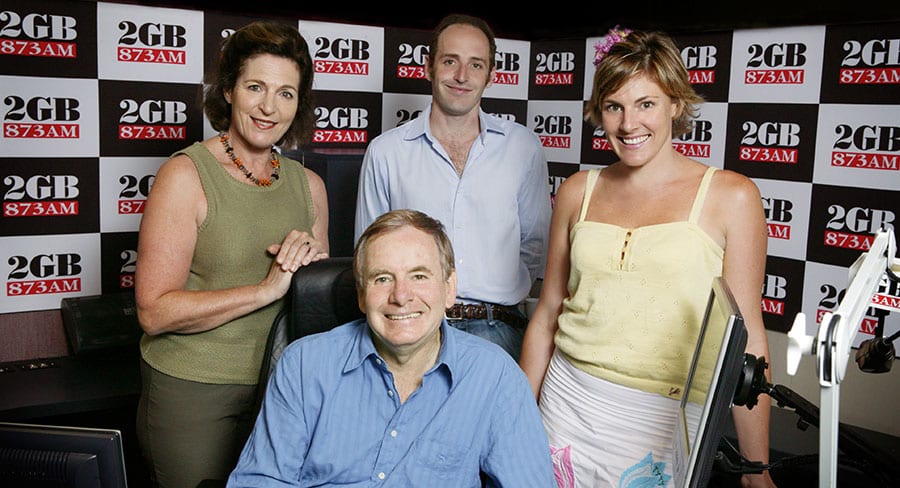2GB’s The Garden Clinic is celebrating 40 years on-air this Easter long weekend, with the show set to welcome back some familiar voices and a prize give away planned for new gardeners as part of the proceedings.
Presented by Linda, Sandra and Graham Ross, The Garden Clinic offers extensive gardening knowledge, practical know-how, top tips and interviews and news from around the world of gardening.
The Garden Clinic started on Easter 1980 when Graham Ross was asked to front a new program on Sunday mornings.
“I had been appearing every Wednesday on Mickie De Stoop’s afternoon show and calls started to come in with no real mechanism to take them. The program manager, Sam Galea, sorted that out technically and away I went,” says Graham Ross.
“Within weeks the show was rating well and by Spring 1980 it had full advertising support – the first real gardening show on commercial radio. Years later, Sam would go on to say in a letter, when Sandra joined me on the program, ‘If you guys keep this quality up you’ll be doing this for the rest of your lives’. He was right.”
The show extended its run time to two hours on both Saturday and Sunday, and then eventually to three hours on both days, making it the longest weekend gardening show of its kind anywhere in the world: six hours of gardening talkback.
“Over the years we’ve travelled a lot around Australia and the world and we were the first to consistently broadcast globally. Our commitment was to take our treasured audience with us everywhere we went,” says Graham Ross.
“At the 1984 Liverpool Garden Festival on the Merseyside we had Gerry Marsden from Gerry and The Pacemakers in the next studio. We were actually broadcasting from a wartime bunker inside the London Home Office. There were no commercial radio studios available back then.
“We did the Chelsea Flower Show on 15 occasions, at one o’clock in the morning because of the time difference. We’ve broadcast from China, Vienna, Austria and Japan, and onboard the Eye of the Wind, a Bicentennial First Fleet re-enactment square-rigger sailing to Tasmania. We also did the first ever live radio broadcast using a new-fangled gadget called a mobile phone. It was the size of a small suitcase and Sandra was perched on the roof of a Manly ferry during the Great Sydney Ferry Race to get a signal.”
Graham Ross says The Garden Clinic has always been a family affair, with his and Sandra’s children Linda and Kent growing up doing their homework in the foyer of 2GB.
“It was 20 years, 2000, before we had a weekend off. Kent was even our panel operator for years, and Linda still fills in for me if I’m away filming,” says Graham.
“We’ve taken 250,000 calls during more than 4,100 shows, running up over 8,000 hours of continuous weekend garden broadcasting. We’ve been told it’s some sort of Australian radio record, having the same presenters, same station, same time slot (mainly) and same subject matter throughout 40 years.”
The Ross family have invited a galaxy of famous names to take part in their broadcasts over four decades.
“One day in 1982, Spike Milligan came on for a 30-minute chat and stayed for three hours. He suggested we start a garden club which he initially called the Sir Nigel Molesworthy Glee Club, and 10 minutes later changed to the Garden Clinic Club. He’s our club founder, funny enough,” Graham reminisces.
“Malcolm Fraser launched the Year of the Tree in 1981, at the time a very conservative PM. He returned 30 years later for a chat and he was a full-on greenie. Nursery legend Valerie Swane launched varieties of roses many times over the years, and Premier Neville Wran donated money to the Royal Botanic Garden glasshouse in 1980, but not before he swore at me when my old tape recorder broke down.
“Malcolm Turnbull launched the Australian Garden Council in 2015 on our show. Last year, David Littleproud, the Agriculture Minister, announced surprise funding for the Council on our show, the first time in Australia’s history that gardening was supported directly by the federal government.”
As The Garden Clinic marks 40 years on air it is making sure its history is carefully archived, with every page of 2GB caller questions since 1980 to enter the Mitchell Library archives, along with the rest of Graham Ross’s written stories.
